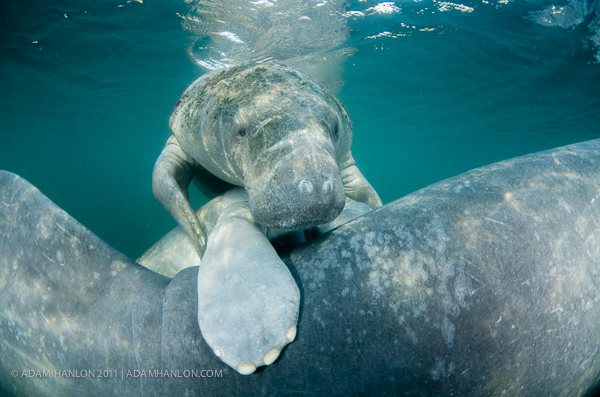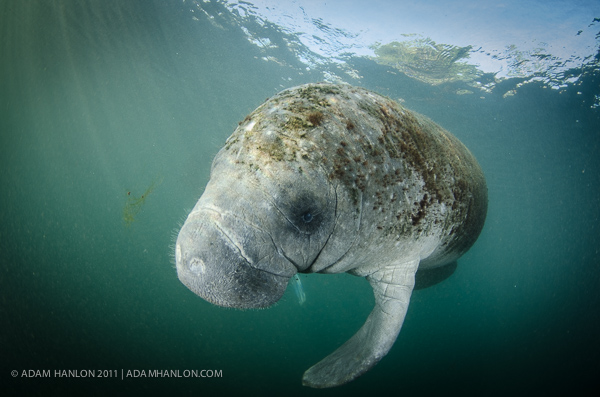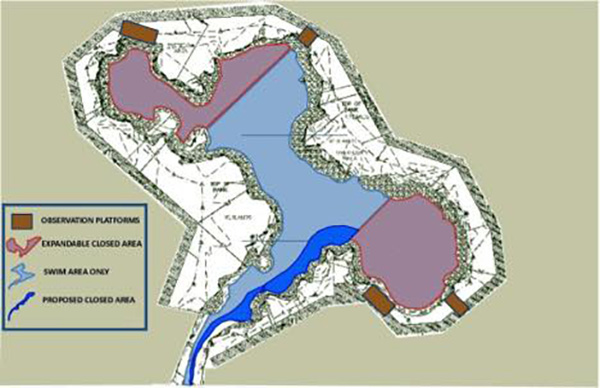Wildlife Service closes Three Sisters Springs and releases proposed management plan

The US Fish and Wildlife Service (USFWS) closed the Three Sisters Springs over the weekend of 13 and 14 December, due to the cold weather causing a high concentration of manatees (Trichechus manatus latirostris)). In turn this caused “high turbidity” making the area unsuitable for swimmers. If the colder weather continues, it is likely that there will be more closures in future. Please bear in mind that there are other areas where manatees can be viewed, although it will be worth checking with the Crystal River Wildlife Refuge by email prior to your visit if you are planning to go there.
In other manatee related news, the service has been conducting an environmental assessment of area and the results have been released today. Among the list of proposed new regulations is one banning the use of camera flashes unless a “special-use” permit is obtained. The proposal states that these will only be available for “educational or research purposes”. It should be born in mind that these are currently proposals, and there is now a consultation period lasting until 2 January 2015 prior to any implementation.

USFWS Southeast Region News Release
Public Invited to Comment on Proposed Strategies to Protect Wintering Manatees at Three Sisters Springs
The U.S. Fish and Wildlife Service wants to increase manatee protections and improve visitor experiences at Three Sisters Springs.
The Service seeks public review of a draft environmental assessment for management actions to protect manatees and still allow public access at Three Sisters Springs during the winter season.
“We have incorporated sound, professional judgment and safety considerations for manatees and people with this approach,” said Gude. “Our goal is to protect manatees and also allow a quality wildlife viewing experience.”
Three Sisters Springs, a unit of Crystal River National Wildlife Refuge, provides a place with consistently warm water for about 250 to 300 manatees to avoid potentially lethal colder temperatures in the open waters away from the springs during the winter months. Potential crowding with manatees may occur from November to March because as many as 100 swimmers and paddlers per hour enter Three Sisters Springs to see the manatees.
“We appreciate the support of the entire community as we go through this effort together,” said Andrew Gude, who manages Crystal River National Wildlife Refuge, as well as Lower Suwannee, Cedar Keys, and Chassahowitzka National Wildlife Refuges. “Swimming with manatees is a tremendous experience, and I know that when done properly, everybody benefits. For people, it is the experience of a lifetime. For the manatee, they will now have a lifelong supporter who appreciates the value of wildlife in their natural environment. That’s good for conservation and good for future generations.”
The public is encouraged to review the draft Environmental Assessment and provide comments by email before January 2, 2015. Comments may be addressed to, U.S. Fish and Wildlife Service, Crystal River NWR, ATTN: Andrew Gude, 1502 SE Kings Bay Dr., Crystal River, FL, 34429.
Three Sisters Springs is the only confined-water body in the United States that is open to the public while wintering manatees are present. Crystal River National Wildlife Refuge manages Three Sisters Springs under a Management Agreement with the City of Crystal River and the State’s Southwest Florida Water Management District.
The proposed actions will implement interim strategies to address increased crowding between manatees and the public for the 2014-2015-manatee season and better inform future management. The proposed actions would also, if approved, allow the Service to meet commitments and obligations to the City of Crystal River and the Southwest Florida Water Management District.
Proposed Management Measures
The Service is proposing the following interim measures for the winter months (December through March 2015) to help reduce the chance of adverse impacts on manatees associated with watercraft and manatee viewing activities and to inform future management actions:
Continue to implement temporary full closures to prohibit visitation inside the warm water springs located at Three Sisters Springs during extreme cold weather events and violations of the 12 prohibitions identified by the Kings Bay Manatee Protection Area Rule.
Install an in-water, non-motorized vessel tie-up/disembarking area east of the warm water spring located at Three Sisters Springs, and prohibit vessels, including kayaks, canoes, and large inflatable floats, within the spring heads as well as the spring run to reduce manatee disturbance and potentially unsafe encounters with swimmers.
Guide the public to use the western half of the spring run extending into the warm water spring heads located at Three Sisters Springs to maintain an open channel for manatee ingress and egress.
Create two expanded no-public entry areas within the spring heads by closing the eastern and western lobes known as Pretty Sister and Little Sister located on Three Sisters Springs.
Restrict in-water visitation to the warm water springs located at Three Sisters Springs to provide manatees time to aggregate during the colder periods of the morning and late afternoon. In-water visitation will be allowed from 10:00 a.m. to 5:00 p.m.
Require a Special Use Permit for the use of any type of flash photography inside the warm water spring at Three Sisters Springs. Special Use Permits for diffused flash photography will only be issued for educational or research purposes.
Amend Special Use Permit conditions for Commercial Wildlife Observation Guides using the warm water springs at Three Sisters Spring to require the following specific stipulations: a City of Crystal River business license or exemption letter, in-water insurance for their clients, and an in-water guide to accompany the clients into the Three Sisters Springs.
Implement an expedited communication plan to actively inform visitors and stakeholders about the proposed action.

The mission of the U.S. Fish and Wildlife Service is working with others to conserve, protect, and enhance fish, wildlife, plants, and their habitats for the continuing benefit of the American people. For more information on our work and the people who make it happen, visit www.fws.gov/southeast. Connect with us on Facebook, follow our tweets, watch our YouTube Channel, and download photos from our Flickr page.